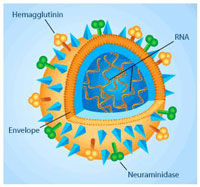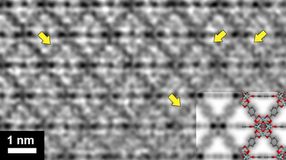Celera Compound Enters Development for Chagas' Disease
Rockville, MD and San Francisco, CA—February 14, 2002--Celera Genomics, an Applera Corporation business, announced today that the Institute for OneWorld Health (IOWH) and the National Institutes of Health (NIH) have initiated development of CRA-3316 as a potential new treatment for Chagas' Disease.
CRA-3316 is a cysteine protease inhibitor discovered by the Celera research team. Celera has given IOWH the exclusive license to develop the compound for parasitic infections in humans, free of any royalty fees or cash payments. More details regarding Chagas' Disease, CRA-3316, and this collaboration are available on the Celera Genomics website at http://www.celera.com/company/home.cfm?ppage=press. Celera indicated that IOWH, in conjunction with the NIH, believes that this compound could represent a therapeutic strategy that is affordable, appropriate for short-term administration, and potentially effective in eradicating the disease. As a result, IOWH has agreed to sponsor all development activities, including production of drug substance, IND-enabling safety studies, and Phase I clinical trials. IND-enabling studies of CRA-3316 are currently underway with a goal of evaluating the compound in humans beginning in 2002. If clinical trials are successful, the compound could represent the first new treatment for Chagas' Disease in decades, and a proof-of-concept breakthrough for inhibiting cysteine proteases in other parasitic organisms.
Dr. Victoria Hale, CEO and founder of IOWH stated: "IOWH drug development scientists are very excited to enable the early clinical development of CRA-3316 for Chagas' Disease and provide the needed proof of concept for targeting cysteine proteases for other parasitic diseases. We appreciate Celera's contribution to this effort. This collaboration should serve as a model for developing promising anti-parasitic compounds in the future."
Chagas' Disease is a parasitic infection estimated to afflict 16-18 million individuals in South and Central America, with an annual mortality rate of 50,000, based on figures provided by the Centers for Disease Control. The parasite, Trypanosoma cruzi, is related to the agent responsible for African sleeping sickness, and it depends on a cysteine protease, cruzain, to sustain its life cycle. The compound, CRA-3316, targets the major protease produced by a parasite that causes Chagas' Disease.
According to Professor James McKerrow at the University of California, San Francisco, inhibition of cruzain by CRA-3316 is lethal to the parasite that causes the Chagas' infection, but does not harm the treated patients because humans do not have this enzyme. Standard therapies for the disease cannot be used for chronic infections due to toxicity, and can only be used for up to four months, in acute phases of the disease. Dr. Jim Palmer, Senior Director of Medicinal Chemistry at Celera, an inventor of this class of compounds, noted, "The acute nature of parasite-borne infections suggests that short-term treatment by irreversible inhibitors such as CRA-3316 may be a viable approach. We would expect a very short course of CRA-3316 therapy based on results obtained thus far, with eradication of the parasitic infection." Palmer also indicated that Professor McKerrow has assembled an extensive body of preclinical evidence to demonstrate the potential of the approach.
The compound CRA-3316, formerly referred to as APC-3316, is covered by US Patent 6,287,840 issued to Celera September 2001, entitled "Irreversible cysteine protease inhibitors containing vinyl groups conjugated to electron withdrawing groups," [Palmer; J. T.; Rasnick; D.; Klaus; J. L., inventors].
Celera, through its acquisition of Axys Pharmaceuticals, Inc., of South San Francisco, CA, has an extensive background in the discovery and development of protease inhibitors. The inhibition of proteases that cause disease has been the focus of the South San Francisco medicinal chemistry group since the mid-1990's, and has lead to important drug development opportunities in osteoporosis, rheumatoid arthritis, asthma, atherosclerosis, and oncology. The development and commercialization of drugs from some of these programs are in partnerships with global pharmaceutical companies, including Aventis and Merck, while other programs remain unpartnered.























































